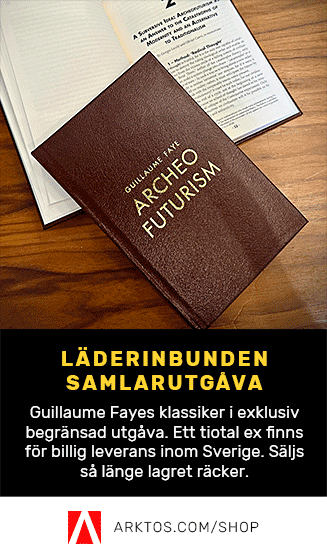Dagens inlägg kommer att bli kontroversiellt, både för bisexualistiska RFSL:are och för homofoba puritaner. Det är inte desto mindre ett nödvändigt inlägg för att komma tillbaka till den indo-ariska och sunda synen på saker och ting, och för att komma förbi den sexofoba puritanism som dominerat vår kultur i mer än tusen år.
Den traditionella synen på könen är att de är uttryck för metafysiska och essentiella kategorier (Yin och Yang är väl mest kända), och att den androgynism som sveper över världen idag, där man hävdar att ”kön är bara sociala konstrtuktioner”, är en styggelse. De flesta traditionella civilisationer har dock varit öppna för möjligheten av individer som råkat födas i fel kropp (där andligt och fysiskt kön inte stämt överens kort sagt) eller med mindre tydlig könsidentitet. I enlighet med den traditionella inställningen, har man då försökt att hitta en social nisch även för dessa (där underhållning, prostitution, administration och mysticism tycks ha varit vanligast). Berdacher, hijras, och vad man nu kallat dem.
Det är viktigt att poängtera att detta inte betytt att man låtit dem sprida bisexualistiska ideologier av den typ som homolobbyn gör, där man vill avskaffa könsrollerna, avskaffa kärnfamiljen, och påstår att alla egentligen är bisexuella och att heterosexualitet är en sorts ”förtryck”. Evola skiljer mellan naturliga homosexuella, och dem som blivit det på grund av miljö, och menar ingalunda att det är sunt när exempelvis barn som är heterosexuella till sin natur blir homosexuella på grund av miljöfaktorer.
Samtidigt är det tveksamt om Västerlandets ”HBT-personer” hade gjort sig till företrädare för sådana anti-sociala läror om samhället i stort erbjudit dem en godkänd nisch istället för att förneka deras existens. Hur som helst, nog med kommentarer. Här kommer utdraget ur Eros and the Mysteries of Love/Metaphysics of Sex:
Homosexuality is so widespread a practice that it cannot be overlooked in a doctrine of sex. Goethe wrote that ”it is as old as mankind and therefore can be said to be a part of nature although it is contrary to nature”.
……
To find an explanation it is necessary to descend to a lower level and examine various empirical possibilities. Normally two forms of homosexuality are distinguished in sexology: One has an inborn, natural character, whereas the other has an acquired character and is conditioned by psychological and sociological factors influenced by a person’s environment. But in the second of these forms it is necessary to give a proper value to the distinction between forms having a vicious nature and forms that presuppose a latent predisposition which is aroused under given circumstances. It is necessary to set forth this condition because, given the same situation, different types behave in different ways and may not become homosexual. It is important, however, not to consider the inborn form of homosexuality in a rigid way but to allow a certain possibility of variation.
In natural homosexuality or in the predisposition to it, the most straightforward explanation is provided by what we said earlier about the differing levels of sexual development and about the fact that the process of sexual development in its physichal and, even more so, in its psychic aspects can be incomplete. In that way, the original bisexual nature is surpassed to a lesser extent than in a ”normal” human being, the characteristics of one sex not being predominant over those of the other sex to the same extent. Next we must deal with what M. Hirschfeld called the ”intermediate sexual forms”. In cases of this kind (for instance, when a person who is nominally a man is only 60 percent male).it is impossible that the erotic attraction based on the polarity of the sexes in heterosexuality – which is much stronger the more the man is male and the woman is female – can also be born between individuals who, according to the birth registry and as regards only the so-called primary sexual characteristics, belong to the same sex, because in actual fact they are ”intermediate forms”. In the case of pederasts, Ulrich said rightly that it is possible to find ”the soul of a woman born in the body of a man”.
But it is necessary to take into account the possibility of constitutional mutations, a possibility that has been given little consideration by sexologists; that is, we must also bear in mind cases of regression. It may be that the governing power on which the sexual nature of a given individual depends (a nature that is truly male or truly female) may grow weak through neutralization, atrophy, or reduction of the latent state of the characteristics of the other sex, and this may lead to the activation and emergence of these recessive characteristics. And here the surroundings and the general athmosphere of society can play a not unimportant part. In a civilization where equality is the standard, where differences are not linked, where promiscuity is a favor, where the ancient idea of ”being true to oneself” means nothing anymore – in such a splintered and materialistic society, it is clear that this phenomenon of regression and homosexuality should be particularly welcome, and therefore it is in no way a surprise to see the alarming increade in homosexuality and the ”third sex” in the latest ”democratic” period, or an increase in sex changes to an extent unparallelled in other eras.
s. 62-64.










